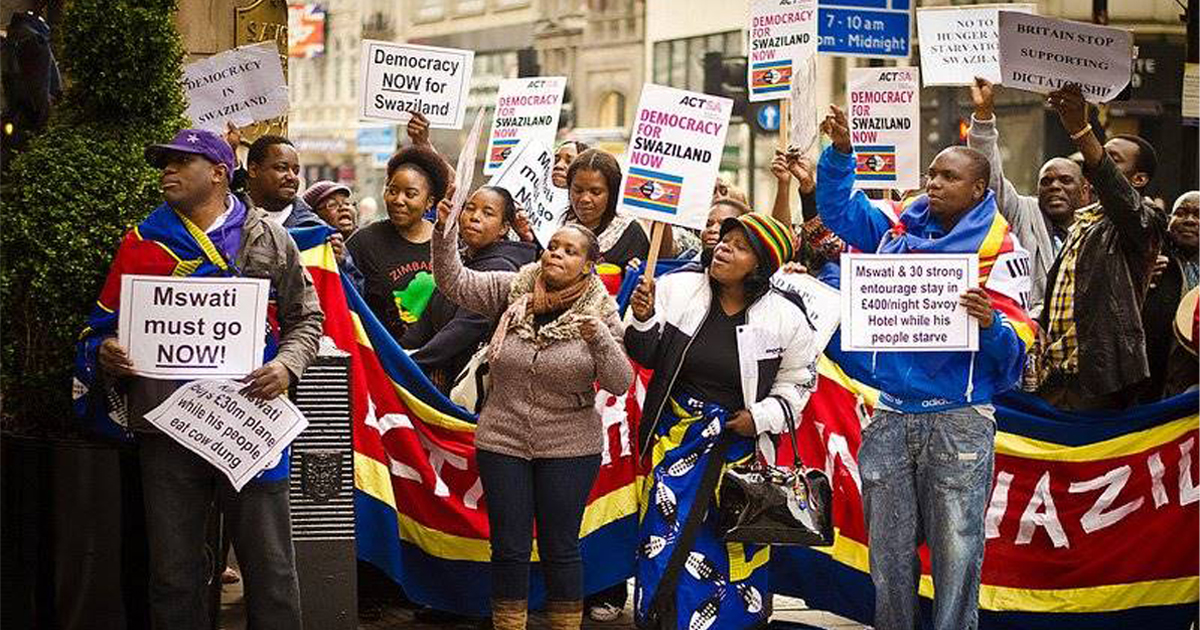The Centre for Human Rights, Faculty of Law, University of Pretoria is concerned with the gross and systemic human rights violations targeted at human rights defenders, political activists, and civil society actors; because of calls for greater reforms in Eswatini’s political governance system.
In letters sent to the Prime Minister, the President of the Senate, and the Speaker of the House of Assembly of Eswatini; the African Commission on Human and Peoples’ Rights; the Pan African Parliament and the SADC Secretariat, the CHR calls on them to address and intervene in the human rights and democracy crisis in Eswatini.
Citizens of Eswatini are denied political participation rights, as they cannot directly vote for their Prime Minister and party parliamentary representatives, because political parties have not been given the space to contest for political power. This situation started on 12 April 1973, when the late King Sobhuza II abrogated the National Constitution of 1968 and banned the existence and operation of political parties through Proclamation No 1 of 1973 (1973 Decree). In 2005, a new Constitution of the Kingdom of Eswatini Act 1 of 2005 was enacted to formally introduce the tinkhundla (constituency) based system of governance.
This system of governance emphasises the devolution of state power from central Government to tinkhundlaareas and individual merit as a basis for election or appointment to public office. This essentially means political parties are not allowed to participate in elections as was confirmed in Sithole NO and Others v The Prime Minister and Others (35 of 2007) [2008] SZSC 22 (23 May 2008), where the Supreme Court pronounced that political parties were not allowed to field candidates to contest for elections, however, members of such parties could participate based on individual merit.
Despite the Eswatini Constitution’s provisions relating to its supremacy, the 2005 Constitution does not expressly abrogate the 1973 Decree and is silent on the operation and effects thereof, which effectively means that it is still in force. Further, its provisions are silent on the existence, role and operation of political parties in the governance architecture. As a result, opposition political parties, pro-democracy activists, and members of civil society organisations calling for a multiparty democracy are routinely assaulted, detained, arrested, tortured, or killed by state-sponsored security agents.
The Centre for Human Rights is particularly concerned about the situation of pervasive human rights, which saw the brutal assassination of renowned lawyer and human rights defender, Thulani Maseko, the Centre alumnus, class of 2005. The right to life, the right not to be subjected to torture, cruel, inhumane, or degrading treatment, and the right to equality before the law are non-derogable rights for which the state party must adopt legislative measures for their effective realisation. The aforementioned ongoing human rights infringements are a grave violation of the rights protected under the African Charter on Human and Peoples’ Rights (African Charter), to which Eswatini is a state party.
Before Thulani’s assassination on 21 January 2023, Eswatini’s failure to effectively respond to the needs of its citizens led to civil unrest in June 2021. The civil unrest was precipitated by the repressive measures of the government to silence people desperately calling for multiparty democracy. In response, the government unleashed riot police, who violently meted out violence on the people who were genuinely exercising their right to freely protest and demonstrate. As a result, an estimated of 46 people died, 245 were heavily wounded, and 337 were arrested. In addition to these human rights violations, two members of parliament were arrested under trumped-up charges relating to terrorism and they have remained in custody awaiting their trial. Another political activist was doused with petrol and set alight in the face by state security agents at a roadside checkpoint.
Calls to civil society, human rights mechanisms and Eswatini
In light of the egregious human rights violations and democracy deficit in Eswatini, the Centre for Human Rights calls on civil society organisations to continue their efforts to document the violations and lobby the government to desist from violating the freedoms set out in the Eswatini Constitution and in treaties to which the country is a party, and pursue justice for the victims. The Centre for Human Rights also calls on the Pan African Parliament and the African Commission on Human and Peoples’ Rights to conduct investigations to establish the human rights violations taking place and issue recommendations, reminding the state of its obligations to protect, promote, respect and fulfil human rights. The Kingdom of Eswatini must cooperate with civil society, regional human rights mechanisms and the people of Eswatini in facilitating political dialogue before the September 2023 elections. The Centre for Human Rights further calls on Eswatini to ensure that independent investigations of the human rights violations from 2021 to 2023 are conducted and the perpetrators held accountable.
For more information, please contact
Professor Frans Viljoen
Director: Centre for Human Rights
Professor of International Human Rights Law
Tel: +27 (0) 12 420 3228
Fax: +27 (0) 86 580 5743
frans.viljoen@up.ac.za
Lakshita Kanhiya
LLM Candidate, Human Rights and Democratisation in Africa, 2023
Eswatini Advocacy Group
lakshita.kanhiya@gmail.com


